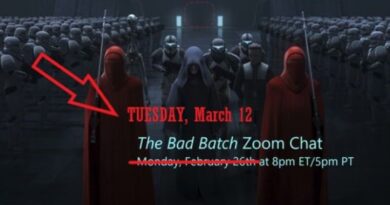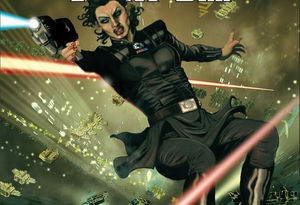The Clone Wars: Season Four: Season In Review – Part Three
Continuing our discussion from Part One and Part Two, here’s more of our season in review for Season Four of The Clone Wars.
I got a little ahead of myself last week when we talked about Obi-Wan’s character growth in between the Slaves of the Republic arc and the Bounty Hunters arc. The “Friends In Need” episode was a one-shot focusing on Ahsoka and her friendship with Lux Bonteri. First off, did anyone else think the chemistry was missing between the pair?
Lex: Sort of. I didn’t interpret it so much as a lack of chemistry, as Lux being so focused on his revenge plan against Dooku that he wasn’t really thinking about anything else. Ahsoka wasn’t supposed to be there, and he didn’t want to let anything get in the way of his plot; likewise, 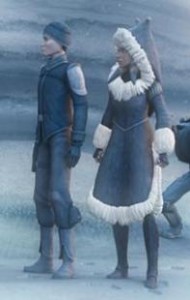 I think Ahsoka was very off kilter in reacting to how Lux treated her, because she expected him to be more friendly and didn’t know how to handle his standoffish focus. At the end, though, when they had escaped the Death Watch and were saying goodbye, I thought Lux showed more genuine emotion toward her.
I think Ahsoka was very off kilter in reacting to how Lux treated her, because she expected him to be more friendly and didn’t know how to handle his standoffish focus. At the end, though, when they had escaped the Death Watch and were saying goodbye, I thought Lux showed more genuine emotion toward her.
Megan: With the quality of the writing in “Friends in Need” being what it was, I have trouble even assigning the word “chemistry” to this pair. Their relationship was full of meaningful stares and flighty music, but Ahsoka seemed to have no attraction toward Lux beyond the friendship and loyalty she shows most people. Their romantic relationship is forced on the viewer as much as it is forced on Ahsoka: Lux kidnaps her, tells everyone that they’re betrothed, and kisses her to distract the bad guys. We never get to see the emotional side of the story from her point of view. I thought this was one of the least effective relationships in the series.
Tricia: I’m with Megan on this. Even prior to the season this episode was billed as one that would allow Ahsoka to explore more about interpersonal relationships. I thought they could take this any number of great ways. Instead the story turned out to be trope-filled. The exciting parts of the episode like Bo-Katan’s and Ahsoka’s badass fighting felt muted even though they were blatant attempts at “show” that those characters are strong. Artoo’s role detracted from the story. More time should have been given to Ahsoka’s and Rex’s predicament and to fleshing out their characters. In the balance, Artoo had already headlined two episodes earlier in the season. When Artoo saved the day, I was disappointed.
I may have partly answered my next question, but I’ll pose it to Lex and Megan.
Ahsoka is shown as a skilled, strong warrior, which is great to see onscreen, but some of the storytelling elements felt like they went back to old storytelling tropes that put female characters into a certain set of roles and male characters into another set of roles. I know Megan brought this up in her review, and I’d like to talk about it some more.
Lex: They did, although there’s a juxtaposition with the Zygerria arc there, I think. In the Zygerria mission, Ahsoka is willing to play the part of a slave because it’s necessary to her role in the undercover operation mission. When Ahsoka goes to rescue Lux, she’s in strong Jedi warrior mode, and she’s pretty bold with him until the Death Watch shows up. Once she realizes the situation in the camp, she plays along in the expected role, trying to protect Lux and the captives. Once the Death Watch cross the line, though, she reveals herself and does a lot of damage until their bigger numbers take her down. So while Ahsoka does slip into those roles, it strikes me that it’s really because she chooses to, not that she’s forced into them.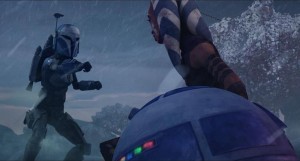
Megan: Ahsoka does agree to go along with her subservient role in “Friends In Need.” Any romantic feelings she may have are used as a distraction, to make her and Lux appear less dangerous. On the other hand, Bo-Katan fulfills another role: the strong female warrior whose only character trait is her strength.
Tricia: As a storyteller I’m not opposed to placing a character into a certain role because he or she is the most appropriate gender or species. For instance in Mission: Impossible 3: Ghost Protocol, they needed the female operative to put on a nice dress and distract their target. Even though that character had to fulfill the role, the writers for the movie didn’t just assume she’d know how to act sexy or that she couldn’t handle the physicality of her situation. Within the Star Wars EU, Piggy, a Gamorrean member of Wraith Squadron, was often placed in mission assignments as the “dumb guard” or “porter” even though he was one of the smartest team members. Where they had to use him in those type of roles said a lot about the culture they were inserting in to. If you can use those situations as a teachable moment – get the readers or viewers to consider the mindset that creates that type of stereotype – then all the better. The long and short of my point is that I’d like to see the writers do a mental check at times: Are we writing this because that’s what we’ve seen before? (For instance, the young women all held as captives as opposed to using young men and women.) Another question to consider as a writer: Did we consider modernizing old tropes or turning them on their head? Princess Leia is an example of what can happen when those questions are taken into consideration. Lucas took the princess trope and ripped the damsel-in-distress out to create a new type of character that grabbed peoples’ attention. I’d like to see more thinking outside “the box.” Essentially, my opinion is that “A Friend in Need” didn’t try to break out of tried-and-true molds.
Let’s dig deeper into the Bounty Hunters arc. I liked a lot of things about this arc, but I think it also highlights some of the weird storytelling pacing that occurred this season. “The Box” as a stand-alone was a cool story, but when I thought about the four-part arc specifically as a whole story, “The Box” didn’t seem necessary. Did anyone feel this way?
Lex: In this arc, I thought the first two episodes were paced pretty well, in setting up Obi-Wan undercover, the prison break, and insinuating him with Moralo Eval and Cad Bane to earn their trust enough to be part of the mission. 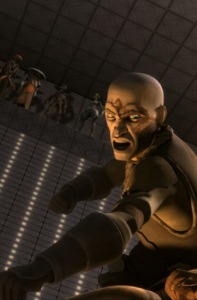 But yes, I don’t think we needed a full episode for the plot points covered in “The Box” – which were basically Obi-Wan trying to keep as many of the bounty hunters alive as possible (so he wouldn’t feel responsible for their deaths) and Dooku and Eval trying to root out the undercover Jedi (with the various traps in the chambers). I think those points could have been covered in maybe 12-15 minutes instead of 22 minutes, allowing those extra minutes to be used to expand the time for the last episode of the arc, which felt very rushed – especially the final duel with Dooku and its aftermath.
But yes, I don’t think we needed a full episode for the plot points covered in “The Box” – which were basically Obi-Wan trying to keep as many of the bounty hunters alive as possible (so he wouldn’t feel responsible for their deaths) and Dooku and Eval trying to root out the undercover Jedi (with the various traps in the chambers). I think those points could have been covered in maybe 12-15 minutes instead of 22 minutes, allowing those extra minutes to be used to expand the time for the last episode of the arc, which felt very rushed – especially the final duel with Dooku and its aftermath.
Megan: I enjoyed “The Box”, but then, ever since Indiana Jones and the Temple of Doom I’ve enjoyed stories of people working their way through deadly obstacle courses. “The Box” definitely felt like a showcase for new characters in an arc that otherwise focused on Anakin, Moralo Eval, and Cad Bane, but it was an enjoyable side-story.
Tricia: I feel conflicted on “The Box.” I enjoyed it for the same reasons Megan stated, but when I look at the episode within the overall arc of the season I felt like the time might have been better spent elsewhere. It’s a matter of pacing and hitting the right points. This may have to do with the fact that while I liked the Bounty Hunters arc (and I love Obi-Wan), it slowed down the forward pace of the whole season. I think the season could have been faster and leaner without the side trip to the Box, or maybe the Box should have been incorporated differently. Interestingly enough, a friend had noted to me that his son (who was catching up on the show via DVR) had no interest in the Bounty Hunter episodes and wanted to jump ahead to the Darth Maul arc. It’s possible four weeks of the Jedi hero Obi-Wan not appearing as himself might have been too complicated of a concept for the target audience.
There’s an interesting symmetry between the Krell arc and the Bounty Hunters arc. In one, the clones and their personal code are evolving; in the other, it’s the Jedi and their code. In a way the war is bringing them closer to each other in what they’re willing to do. Any specific thoughts on this?
Lex: There is a funny little contrast between Rex on Umbara, who decides that he needs to not follow orders, and Obi-Wan in the Rako Hardeen role, where he decides to go along with the plan to fake his own death and lie to Anakin even though he knows how much it will hurt his best friend. Rex kept trying his hardest to find another way to avoid the catastrophic implications of Krell’s plans, while Obi-Wan should have tried harder to think of another path than the one he went down. Definitely very interesting thematically.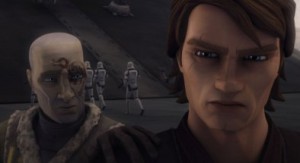
Megan: The clones disobey the orders given to them by a Jedi who turns out to be corrupt, and Obi-Wan obeys the orders of Jedi who seem to Anakin to be corrupt. The Council doesn’t come off as great developers of a system either way, which I think shows how the Old Republic Jedi order is not suited for war. I don’t think that Obi-Wan was anywhere near feeling that the bounty hunters were as disposable as the clones were to Krell, but the Bounty Hunters arc did show how a lesser (or less uptight) person might have been tempted.
Tricia: The Jedi Council is definitely designed as a peacekeeping force, an open palm holding back oppression, as opposed to a fighting force, a closed first meant to strike aggressively and quickly. Nothing in their rules or recent experience showed the Jedi Order how to handle the moral stickiness of war. Turning peacekeepers into killers is bound to produce moments for which they are unprepared. When the Jedi found themselves in a battle for survival on Geonosis they seized their greatest opportunity for survival, the Clone Army. They haven’t had time since the war began to sit down and consider the implications of growing humans as cannon fodder or what to do with these clones if they come out on the other side victorious. Every moment of the war is about surviving for both the Jedi and the clones. Interestingly enough, the bounty hunters do have a code to live by, which they enforce among themselves, and compared to the clones and the Jedi they seem to be the group better prepared to make it to the other side of the war. And yes, I get the irony that the bounty hunter code is spelled out in “The Box” – the episode I questioned whether it was needed. That reveal was crucial to the season’s arc; I am still convinced they could have compacted the four episodes into three and paced the season better.
That ends Part 3 of our discussion. Our conclusion will focus on the much-hyped Darth Maul arc. Megan, Lex, and I will talk Ventress, Maul, snake-aliens, and our share our final thoughts on Season Four and what we’re hoping to see in Season Five.
- Hyperspace Theories: The Curious Case of Kathleen Kennedy’s Retirement - March 10, 2025
- Hyperspace Theories: SKELETON CREW Ahoy! - December 29, 2024
- Hyperspace Theories: WICKED Part I Rises to the Moment - December 6, 2024








